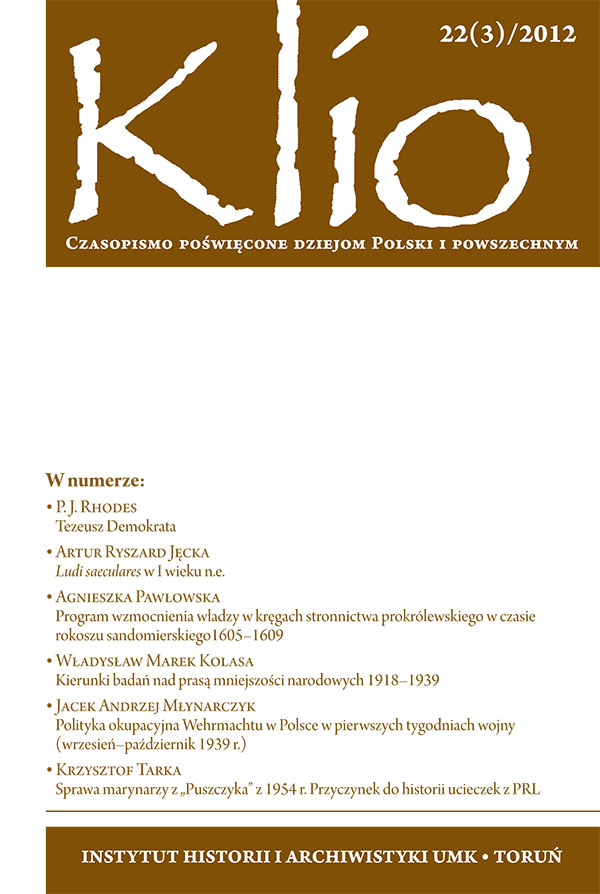Program wzmocnienia władzy w kręgach stronnictwa prokrólewskiego w czasie rokoszu sandomierskiego 1605–1609
DOI:
https://doi.org/10.12775/KLIO.2012.040Abstrakt
This article strives to present reforms prepared by king’s Sigismund III Vasa supporters as faced with Sandomierz Rebellion (rokosz sandomierski). The king’s opposition focused mostly on critique and accusations of the monarch, rather than constructing one compact program of political reforms. The royalists’ camp appeared far more proactive with their ideas of constitutional reforms. The first idea, whose goal was to reform the Polish-Lithuanian Commonwealth and to strengthen king’s role in the government, was presented to the nobles before the Parliament session in 1606. It involved a long-term project of introducing fixed taxes, which were supposed to finance the maintenance of a professional army. It also dealt with the issue of regaining the Swedish throne. The king demanded that the Parliament should debate on the royal propositions only, fearing that including the nobility’s demands would result in breaking up the session, but his postulate was refused. The commentary to king’s instructions was embodied in a paper entitled Votum szlachcica polskiego pisane na sejmiki i sejm roku pańskiego 1606, which undoubtedly originated in the camp of royal supporters. A thorough analysis shows that the document proposed even bolder projects of reforming the army and the Parliament than those proposed by the king. One of the most interesting, and at the same time radical concepts of strengthening the monarchy can be found in the Consilium na tryumfi e krakowskim przy wroceniu się KJM z Janowca jemu dane napisane. It was written aft er the agreement that the king and the rebellious nobles had come to in 1606 in Janowiec. The document postulates two major reforms, that were considered by the author to be vital in reviving the country. The first one was supposed to build financial power of the Commonwealth by introducing fixed taxes for nobility and payments for the titles given by the king. The other issue, crucial for strengthening the country and empowering the king, was the necessity to dismiss the Chamber of Deputies as it was only causing chaos and paralyzing the proceedings. The author considered the Chamber of Deputies to be nothing more but an unnecessary novelty in the political system. As for the senators, he proposed that their number should be gradually decreased. Those actions were supposed to set the stage for a new organ, a “chamber council”, which would include only the most trusted of king’s men. In the beginning of the 17th century the privileged noble class was not willing to allow for systemic changes that would empower the monarchy in the Commonwealth. The phrase absolutum dominium alone, was a loathed synonym of tyranny and violation of laws and freedom. That is the reason why the radical project of reforms described in Consilium… did not stand a chance of success in the Commonwealth. Propositions that were presented to the Parliament in 1606 on the other hand, should be considered as a realistic and balanced step to empower the monarchy. Had they been presented in other circumstances than the emotional and rebellious atmosphere before the parliament session in 1606, they might have been adopted, at least partially.
Stahování
Publikováno
Jak citovat
Číslo
Sekce
Stats
Number of views and downloads: 490
Number of citations: 0



